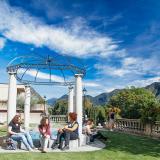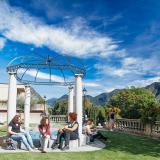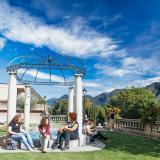| Course | Sec | Course Title | Faculty | Day | Time | ||
|---|---|---|---|---|---|---|---|
| BUS 217 | 1 | Ticino Food/Drink Business (Intensive) | Stack | M-F | 10:00 - 15:30 | ||
|
The Business of Food and Drink in Ticino (This is a 2 week intensive course) (Course dates: 2 - 12 June 2026) This course explores key business and entrepreneurship ideas through the lens of food and drink companies in the canton of Ticino. The class will combine readings, case studies, videos and company visits which together will examine the challenges and opportunities of founding and growing food related businesses. A central component of the course will be visits to a series of firms in Ticino that produce food stuffs or beverages including a brewery, a winery, a cheesemaker, and an organic farm: through these visits, we will discuss with the owners/founders a range of topics including a) how and why they founded the company, b) what challenges they have had to overcome and c) their vision for their firm over the next five to ten years. We will be combining these company visits with readings and class discussions regarding key topics on small business management. Some of the topics we will be exploring include: marketing and promotion strategies; funding strategies; legal issues & regulatory compliance, and market competition.
|
|||||||
| CLCS 204 | 1 | Creative Commerce in Switz (Intensive) | Roy | M-F | 10:00 - 15:30 | ||
|
Story-Making Material: Creative Commerce in Switzerland (This is a 2 week intensive course) (Course dates: 2 - 12 June 2026) In this course, students will explore both ideas and practice surrounding the crafting, making, doing, collecting, and promoting of stories and of authorial personas. What are the different facets of Switzerland's creative, story-based commerce, and how do they shape narrative products and their reception? Via case studies of translation, publishing, museum and foundation centers and practices, as well as of short texts and author-based promotion, the course will interrogate questions of form, (re)presentation and creation and their intersections with the commercial drive behind the circulation of stories in Swiss spaces. Students will engage with the materiality of stories from the point of view of publishers, sites of translation, libraries, museums and exhibitions, book stores, and book fairs across Switzerland. This course will conclude with a "hands-on" component and subsequent reflection, as students themselves undertake virtual and actual book-making and book promotion projects.
|
|||||||
| CLCS 207 | 1 | AI, Cinema, and Philosophy | Gills | MTWT | 14:30 - 17:05 | ||
|
AI, Cinema, and Philosophy: Critical Perspectives (This course must be taken in conjunction with VCA 205) This course critically examines the intersection of AI and cinema through a philosophical lens, exploring how various philosophical frameworks can be applied to analyze AI?s impact on film. Topics include the ethical implications of AI-generated content, the nature of creativity in the age of AI, and the philosophical challenges posed by deepfake technology. Through readings, film screenings, and discussions, students will explore questions around AI?s potential to redefine narrative, authorship, and viewer engagement. This course encourages critical analysis, contextualizing AI?s role in cinema?s evolution and probing its ethical and aesthetic dimensions.
|
|||||||
| CLCS 246 | 1 | Exploring Dance and Movement | Yount | MTWT | 8:30 - 11:05 | ||
|
Exploring Dance and Movement Bodily movement, whether it pertains to professional dance and theatre, political speeches, TikTok videos, or everyday interactions, has been brought to the forefront of an academic field known as Performance Studies. This course explores movement broadly defined, including various events such as concert dance, theatre, film, sports, leisure, online content, and work. A number of theoretical frameworks will be used to understand dance and movement. Lecture and workshop topics may include questions regarding how movement in multiple contexts defines, creates, and perpetuates narrative and culture. As a writing intensive course, students can expect to research and reflect on observed and experienced movement-based phenomena. This course will be taught in the context of the art and architecture initiative with the Lugano Dance Project. Students will have the opportunity to participate in events taking place at LAC. No previous knowledge of movement, dance, or theatre is necessary.
|
|||||||
| ECN 100 | 1 | Principles of Macroeconomics | Filic | MTWT | 8:30 - 11:05 | ||
|
Principles of Macroeconomics This entry-level course in economics covers the fundamentals of macroeconomics and, together with ECN 101, it provides the necessary prerequisites for any other upper-level course in economics. This course introduces students to the study of economics as a field of knowledge within the social sciences. In the first part, focus will be on the definition, the explanation, and the significance of national income, business fluctuations, the price level, and aggregate employment. In the second part, special attention is devoted to the functioning of a payment system based on currency and bank money. Finally, students will discuss the instruments and the functioning of public policy aimed to stabilize prices and maintain high levels of output and employment within the current macroeconomic context. Current economic news will be regularly scrutinized.
|
|||||||
| ITA 100 | 1 | Introductory Italian, Part I | Zanoli | MTWT | 8:30 - 11:05 | ||
|
Introductory Italian, Part I Designed for students with no prior knowledge of Italian. ITA 100 employs immersive experiential learning pedagogy, providing an introduction to the essentials of Italian grammar, vocabulary, and culture. The acquisition of aural/oral communication skills will be stressed and, as such, the predominant language of instruction will be Italian. By the end of the course students will achieve proficiency at the A1 level of the Common European Framework of Reference for Languages. Students are expected to acquire the basic knowledge of the written and spoken structures. Students are expected to read and comprehend short passages in Italian and to draft simple compositions / dialogues. Project-based assignments will be designed to foster practical communication skills and encourage efforts towards increased student integration in the local Italian-speaking community. Whenever possible, students will be encouraged to participate actively in local initiatives, festivals, events and to apply the skills they are mastering in class to their co-curricular learning on and off campus
|
|||||||
| MAT 181 | 1 | Math for Everybody | El Moussa | MTWT | 14:30 - 17:05 | ||
|
Math for Everybody Mathematics can be used by everybody to better understand the world around us, and also make informed decisions throughout our life. This course presents some essential tools for this, spanning from basic math and basic algebra to linear, polynomial, exponential, logarithmic functions, growth sequences, and system of equations with three or more variables. One additional topic from Graph Theory/Discrete Mathematics, Voting Theory, Fairness Concepts, Optimization versus Game Theoretical Approaches will also be covered in the class. Students culminate their learning with a final project, in which they will thoroughly investigate a more complex application to the real world or our lives.
|
|||||||
| MUS 218 | 1 | Music and Politics | Trebici Marin | MTWT | 11:30 - 14:05 | ||
|
Music and Politics: From the French Revolution to Communism This course explores the direct relationship between significant historical events and their effects on musical creation. The analysis of specific works will offer the opportunity to understand the direct impact politics has on art. Important events throughout the 19th and the 20th century will be presented through the impact they had in music history. A special section is dedicated to censorship and discrimination focusing on music written and performed under totalitarian rule. From the Entartete Musik (degenerate music), discriminated against by the Nazis, to John Adams? opera Nixon in China, which marked the end of Mao?s Cultural Revolution, the course investigates the way in which music was able to follow its own creative path.
|
|||||||
| POL 290 | 1 | Govt and Politics of the Middle East | Bregman | MTWT | 14:30 - 17:05 | ||
|
Government and Politics of the Middle East This course examines the political processes that shape conflict and consensus in Middle Eastern societies. From this perspective, main regional conflicts are analyzed. The confrontation between (1)Iran and the Arab World and (2)Israel and the region at large are surveyed in light of intra-Arab antagonisms and the historical great power rivalry for hegemony in the area. Special focus is directed toward an understanding of the politics of modernization and the clash between tradition and modernity. Recommended pre-requisite POL 100.
|
|||||||
| STA 219 | 1 | Academic Travel Log: Picturing the world | Dalfonzo | MTWT | 11:30 - 14:05 | ||
|
Academic Travel Log: Picturing the world around you The focused act of drawing is known to create a deeper understanding and connection to the world around you. In this class you?ll learn how to draw, paint and collage your experiences En Plein Air on campus and around Lugano. Each student will create a personal travel log/sketchbook as they learn skill-building rendering techniques, narrative questioning and prompts. Through this process, you?ll build your ability to create a deeper and more meaningful experience for your academic travel and life.
|
|||||||
| VCA 205 | 1 | AI & Cinema Practice | Fiumi | MTWT | 11:30 - 14:05 | ||
|
AI & Cinema Practice: Crafting the Future of Film (This course must be taken in conjunction with CLCS 207) This course focuses on the practical application of AI tools in filmmaking, offering students hands-on experience with AI-driven storytelling, scripting, and cinematic composition. By combining traditional film techniques with advanced AI tools, students will learn to conceptualize, produce, and edit short films, gaining skills in story structure, character development, and AI-enhanced visual composition. Through workshops and project work, the course examines AI's role in current film practices, with an emphasis on ethical considerations and creative possibilities. The course culminates in a short film project that integrates AI tools from pre-production to post-production stages.
|
|||||||
| WTG 200 | 1 | Adv Academic Writing: Ethics at Work | Rutkowski | MTWT | 14:30 - 17:05 | ||
|
Advanced Academic Writing: Ethics at Work This advanced writing course consolidates students? academic communication skills through the theme of business and work ethics. Students will engage with philosophical texts and case studies dealing with various aspects of business and/or work ethics -- distributive justice, social responsibility and environmentally conscious business practices among others -- in order to improve critical reading, argumentative writing, and oral presentation/debating skills. The course helps students understand that academic communication primarily involves entering a conversation with others and particular emphasis will be placed on responding to other people?s arguments as well as developing their own arguments based on those responses. Using the broad theme of business and work ethics as a medium for discussion, students will not only explore what it means to join an academic community and their role in that community as purveyors of knowledge but also work towards entering the job/internship market with polished application materials. (This writing-intensive course counts towards the Academic Writing requirements.)
|
|||||||
*Dates for these Interim Session courses do not coincide with the regular session dates. Plan your schedule accordingly with your advisor.



